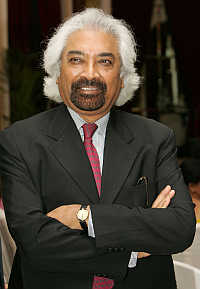 The last three days, the Pravasi Bharatiya Divas has seen a plethora of speakers - from bland (Dr Manmohan Singh) to the polished (Dr Shashi Tharoor). Yet there was none that came remotely close to Dr Sam Pitroda who talked about innovation on the final day.
The last three days, the Pravasi Bharatiya Divas has seen a plethora of speakers - from bland (Dr Manmohan Singh) to the polished (Dr Shashi Tharoor). Yet there was none that came remotely close to Dr Sam Pitroda who talked about innovation on the final day.Pitroda serves as the advisor to the Indian Prime Minister on Public Information Infrastructure and Innovations and is largely said to be responsible for bringing about a telecom revolution in India and unleashing the power of broadband internet.
Addressing a session on innovations, Pitroda pointed out that innovating for a country couldn't be learned at a school. "At B-schools they teach you how to innovate for companies, not for countries. Innovation in a country is far different," he said.
Even so, for the last few years, Pitroda has been attempting to connect the country, its educational institutions and research facilities through a network which he hopes will help India grow better.
"The best brains are focused on solving the problems of the rich," he said, "Whereas they should rather focus on the problems of the poor. The rich have money; they can take care of themselves. And so we need to look at the bottom of the pyramid -- and not in the way of manufacturing shampoo sachets so the poor can afford it but rather in giving them real opportunities. For instance how can we make a mango last for let's say 35 days instead of five so the farmers are able to export it via the sea rather than by (the expensive)
air route. We are working on solutions that are affordable; once they are affordable, they can be scalable," he said in his speech.
Pitroda also spoke about the need to create an eco system for innovation by creating linkages and incubators, offering venture capitals through angel investors and creating a discourse on innovation that will help entrepreneurs to start out.
"Methods of the past are obsolete," he said, "We need to re-think some of the processes and that is being met with a lot of resistance."
Pitroda talked about the need for tod-fod-jod (break and rebuild) models where young students take apart gadgets donated by people and put them together and also an idea that he hopes will further encourage innovators. "We must permit every MP to grant three prizes each for the best innovators," he said adding emphatically 'innovation has to be a national agenda.'
The process, he pointed out was long and arduous. "We need to computerise the nada files," he said referring to the dreaded bureaucratic files that are so often conveniently lost and found, "Until we don't computerise the nada wali files, we won't succeed. The government does not necessarily like the idea of parting with information since information is power."
Talking about the need to use connectivity to create new India, Pitroda talked about the herculean task before him - digitising the entire legal system: the courts, the prisons and the police stations.
Things will change, Pitroda promised, but you can't expect miracles overnight he said adding that it took us a while to get here. "Wait for a bit; in 10-15 years you'll see the change."









